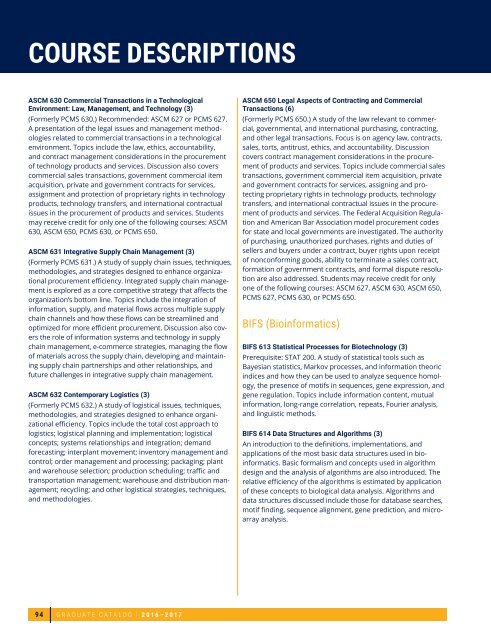2016–2017 2016–2017
2016-2017-graduate-catalog
2016-2017-graduate-catalog
You also want an ePaper? Increase the reach of your titles
YUMPU automatically turns print PDFs into web optimized ePapers that Google loves.
COURSE DESCRIPTIONS<br />
ASCM 630 Commercial Transactions in a Technological<br />
Environment: Law, Management, and Technology (3)<br />
(Formerly PCMS 630.) Recommended: ASCM 627 or PCMS 627.<br />
A presentation of the legal issues and management methodologies<br />
related to commercial transactions in a technological<br />
environment. Topics include the law, ethics, accountability,<br />
and contract management considerations in the procurement<br />
of technology products and services. Discussion also covers<br />
commercial sales transactions, government commercial item<br />
acquisition, private and government contracts for services,<br />
assignment and protection of proprietary rights in technology<br />
products, technology transfers, and international contractual<br />
issues in the procurement of products and services. Students<br />
may receive credit for only one of the following courses: ASCM<br />
630, ASCM 650, PCMS 630, or PCMS 650.<br />
ASCM 631 Integrative Supply Chain Management (3)<br />
(Formerly PCMS 631.) A study of supply chain issues, techniques,<br />
methodologies, and strategies designed to enhance organizational<br />
procurement efficiency. Integrated supply chain management<br />
is explored as a core competitive strategy that affects the<br />
organization’s bottom line. Topics include the integration of<br />
information, supply, and material flows across multiple supply<br />
chain channels and how these flows can be streamlined and<br />
optimized for more efficient procurement. Discussion also covers<br />
the role of information systems and technology in supply<br />
chain management, e-commerce strategies, managing the flow<br />
of materials across the supply chain, developing and maintaining<br />
supply chain partnerships and other relationships, and<br />
future challenges in integrative supply chain management.<br />
ASCM 632 Contemporary Logistics (3)<br />
(Formerly PCMS 632.) A study of logistical issues, techniques,<br />
methodologies, and strategies designed to enhance organizational<br />
efficiency. Topics include the total cost approach to<br />
logistics; logistical planning and implementation; logistical<br />
concepts; systems relationships and integration; demand<br />
forecasting; interplant movement; inventory management and<br />
control; order management and processing; packaging; plant<br />
and warehouse selection; production scheduling; traffic and<br />
transportation management; warehouse and distribution management;<br />
recycling; and other logistical strategies, techniques,<br />
and methodologies.<br />
ASCM 650 Legal Aspects of Contracting and Commercial<br />
Transactions (6)<br />
(Formerly PCMS 650.) A study of the law relevant to commercial,<br />
governmental, and international purchasing, contracting,<br />
and other legal transactions. Focus is on agency law, contracts,<br />
sales, torts, antitrust, ethics, and accountability. Discussion<br />
covers contract management considerations in the procurement<br />
of products and services. Topics include commercial sales<br />
transactions, government commercial item acquisition, private<br />
and government contracts for services, assigning and protecting<br />
proprietary rights in technology products, technology<br />
transfers, and international contractual issues in the procurement<br />
of products and services. The Federal Acquisition Regulation<br />
and American Bar Association model procurement codes<br />
for state and local governments are investigated. The authority<br />
of purchasing, unauthorized purchases, rights and duties of<br />
sellers and buyers under a contract, buyer rights upon receipt<br />
of nonconforming goods, ability to terminate a sales contract,<br />
formation of government contracts, and formal dispute resolution<br />
are also addressed. Students may receive credit for only<br />
one of the following courses: ASCM 627, ASCM 630, ASCM 650,<br />
PCMS 627, PCMS 630, or PCMS 650.<br />
BIFS (Bioinformatics)<br />
BIFS 613 Statistical Processes for Biotechnology (3)<br />
Prerequisite: STAT 200. A study of statistical tools such as<br />
Bayesian statistics, Markov processes, and information theoric<br />
indices and how they can be used to analyze sequence homology,<br />
the presence of motifs in sequences, gene expression, and<br />
gene regulation. Topics include information content, mutual<br />
information, long-range correlation, repeats, Fourier analysis,<br />
and linguistic methods.<br />
BIFS 614 Data Structures and Algorithms (3)<br />
An introduction to the definitions, implementations, and<br />
applications of the most basic data structures used in bioinformatics.<br />
Basic formalism and concepts used in algorithm<br />
design and the analysis of algorithms are also introduced. The<br />
relative efficiency of the algorithms is estimated by application<br />
of these concepts to biological data analysis. Algorithms and<br />
data structures discussed include those for database searches,<br />
motif finding, sequence alignment, gene prediction, and microarray<br />
analysis.<br />
94<br />
GRADUATE CATALOG | <strong>2016–2017</strong>


